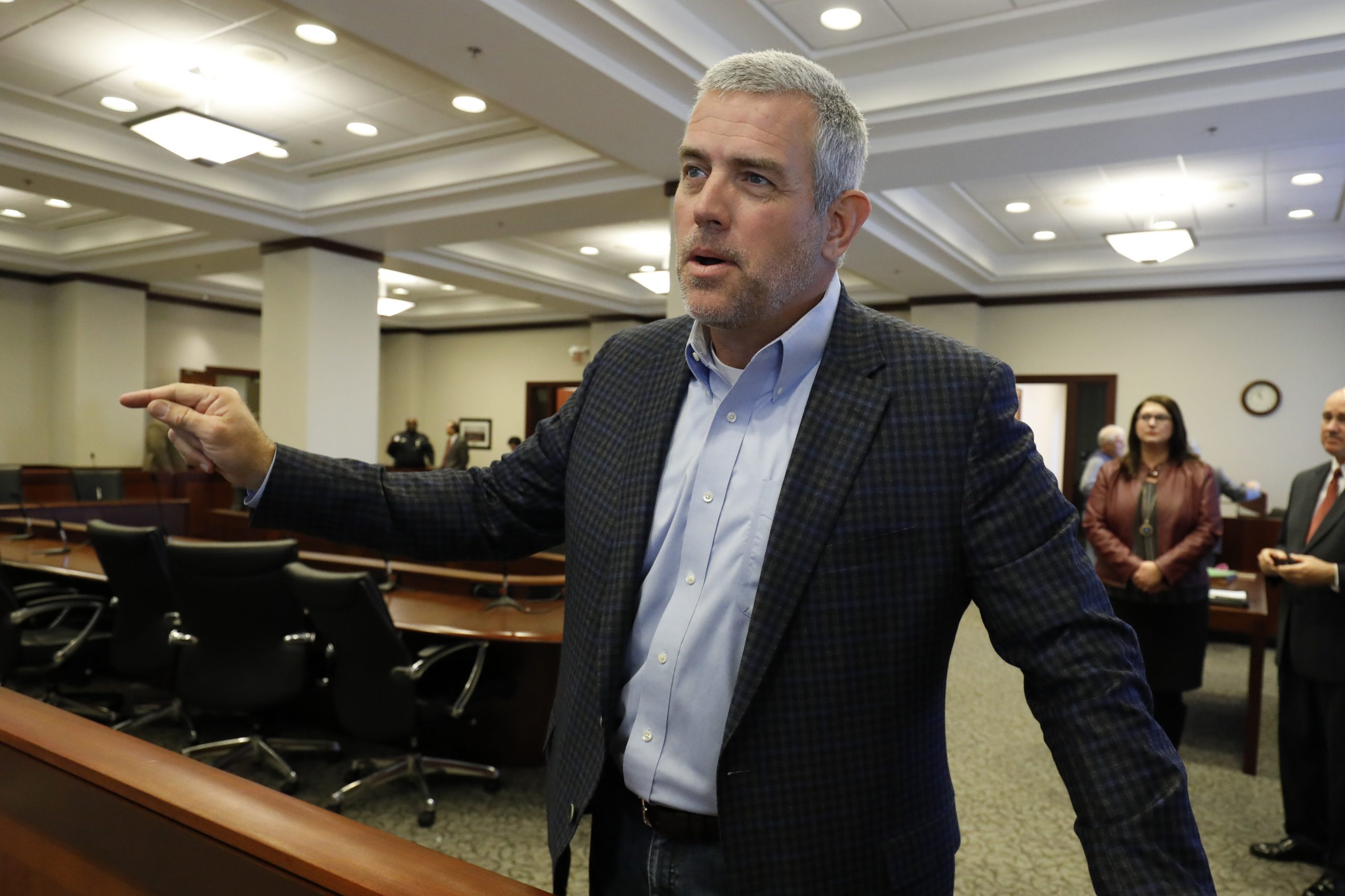Mississippi Today
House Medicaid Committee passes postpartum coverage extension

House Medicaid Committee passes postpartum coverage extension
After months of contention, extended postpartum health coverage coverage for Mississippi moms is one step closer to becoming law.
The House Medicaid Committee, in its first meeting this legislative session, voted Tuesday to advance legislation that would extend postpartum Medicaid benefits from two months to a year.
“This bill demonstrates that we as policymakers also recognize that our commitment to life cannot end once a baby takes his or her first breath,” said Rep. Missy McGee, R-Hattiesburg.
READ MORE: FAQ: What is postpartum Medicaid extension, exactly?
Health professionals and medical organizations have long recommended the policy change. Citing data that shows Mississippi's already-dismal mortality rate is getting worse, they say health problems continue for people who give birth for far longer than two months postpartum. The legislation has the potential to affect thousands — two-thirds of babies born in Mississippi are born to people on Medicaid.
Dr. Dan Edney, state health officer, told Mississippi Today the passage of this legislation is “absolutely necessary” to improve health outcomes in Mississippi.
“This is low hanging fruit for us … because we have way too many of our moms dying related to pregnancy,” Edney said. “It's one of the worst health disparities that we have.”
“I'm so proud to see where we're moving with postpartum. Everybody that's in this wheelhouse agrees — there are no dissenters.”
Until now, House leadership has made the final steps toward the legislation becoming law impossible – despite the fact that most representatives support the legislation, according to a survey conducted by Mississippi Today.
Over the past two years, the Senate has passed multiple measures to extend postpartum coverage in Mississippi. House Speaker Philip Gunn blocked the legislation from coming to a vote last year in the House and appeared poised to do so again this year.
But Gov. Tate Reeves, who has adamantly opposed the legislation, reversed course this weekend and urged state politicians to pass it.
Following his announcement, Division of Medicaid Executive Director Drew Snyder, whose department for months has refused to take a stance on postpartum coverage extension, wrote a letter on Feb. 27 to House Speaker Philip Gunn voicing his support for the legislation's passage. The Division of Medicaid is housed under the governor's office.
Gunn subsequently said that he would not block the legislation from coming to the House floor, as he did during the 2022 legislative session, though he appeared to walk the statement back slightly in an interview with SuperTalk on Feb. 28.
“I noticed on your website here you say that Speaker Gunn is going to let the people vote,” Gunn said. “Well, we've not decided to do that yet. We decided to move the bill out of the committee and keep it alive.”
In his letter, Snyder estimated the policy change would cost the state $7.1 million, according to House Medicaid Committee Chair Joey Hood, R-Ackerman. The state currently has $3.9 billion in surplus funds.
Rep. John Hines, D-Greenville, said during the meeting that he was disappointed that it took the leadership of the state feeling like their backs were “against the wall” for this legislation to pass the committee.
“It is a shame that we have to wait for the political winds to turn or somebody that feels like they're not going to be able to be reelected to do something like this,” he said. “This is a moment that we should be celebrating the lives of women who actually bring life. But yet, it is a political ploy in this process.”
About the allegation of political theater, Hood had “no comment” in an interview with reporters.
As the state expects thousands more births following the U.S. Supreme Court's decision last summer to overturn abortion rights, McGee said this measure is necessary to protect the lives of Mississippians and their babies — by providing longer postnatal care, the risk of preterm birth lowers. Mississippi has the highest infant mortality rate, preterm birth rate and low birthweight rate in the country.
“Healthy moms equal healthy babies, and if we care about babies, we must show that we care for and value their mothers,” she said.
Despite the legislation's passage in the house committee, now its future is up to Hood — he decides when and if it makes it onto the House floor.
Following the meeting, Hood said there was “no timetable” regarding when the legislation might make it to the House.
“It's on the calendar. We're just going to continue to work it through the process,” he said, citing a line he's repeated to the media in recent weeks.
“You know how the legislative process is,” he said. “We still have a long way to go.”
If the legislation passes, Mississippi will join 29 other states that have extended postpartum Medicaid coverage to one year.
READ MORE: ‘Mississippi moms can't wait': Doctors urge legislators to extend postpartum coverage
This article first appeared on Mississippi Today and is republished here under a Creative Commons license.
Did you miss our previous article…
https://www.biloxinewsevents.com/?p=210323
Mississippi Today
On this day in 1917
May 5, 1917

Eugene Jacques Bullard became the first Black American combat pilot.
After the near lynching of his father and hearing that Great Britain lacked such racism, the 12-year-old Georgia native stowed away on a ship headed for Scotland. From there, he moved to Liverpool, England, where he handled odd jobs before becoming a boxer, traveling across Europe before he settled in Paris.
“It seems to me that the French democracy influenced the minds of both White and Black Americans there and helped us all to act like brothers as near as possible,” he said. “It convinced me, too, that God really did create all men equal, and it was easy to live that way.”
When World War I began, he was too young to fight for his adopted country, so he and other American expatriates joined the French Foreign Legion. Through a series of battles, he was wounded, and doctors believed he would never walk again.
No longer able to serve in the infantry, an American friend bet him $2,000 that he could not get into aviation. Taking on the challenge, he earned his “wings” and began fighting for the French Aéronautique Militaire.
He addressed racism with words on his plane, “All Blood Runs Red,” and he nicknamed himself, “The Black Swallow of Death.”
On his flights, he reportedly took along a Rhesus monkey named “Jimmy.” He tried to join the U.S. Air Service, only to be turned away because he was Black. He became one of France's most decorated war heroes, earning the French Legion of Honor.
After the war he bought a Paris nightclub, where Josephine Baker and Louis Armstrong performed and eventually helped French officials ferret out Nazi sympathizers. After World War II ended, he moved to Harlem, but his widespread fame never followed him back to the U.S.
In 1960, when French President Charles de Gaulle visited, he told government officials that he wanted to see his old friend, Bullard. No one in the government knew where Bullard was, and the FBI finally found him in an unexpected place — working as an elevator operator at the Rockefeller Center in New York City.
After de Gaulle's visit, he appeared on “The Today Show,” which was shot in the same building where he worked.
Upon his death from cancer in 1961, he was buried with honors in the French War Veterans' section of the Flushing Cemetery in Queens, New York.
A sculpture of Bullard can be viewed in the Smithsonian National Space and Air Museum in Washington, D.C., a statue of him can be found outside the Museum of Aviation, and an exhibit on him can be seen inside the National Museum of the U.S. Air Force, which posthumously gave him the rank of a second lieutenant. He is loosely portrayed in the 2006 film, “Flyboys.”
This article first appeared on Mississippi Today and is republished here under a Creative Commons license.
Mississippi Today
A seat at table for Democrats might have gotten Medicaid expansion across the finish line
The Mississippi Capitol is 171,000 square feet, granted a massive structure, but when it comes to communication between the two legislative chambers that occupy the building, it might as well be as big as the cosmos.
Such was the case in recent days during the intense and often combustible process that eventually led to the death of Medicaid expansion and with that the loss of the opportunity to provide health care for 200,000 working poor Mississippians with the federal government paying the bulk of the cost.
Democrats in the state House came under intense pressure and criticism for blocking a Medicaid expansion compromise reached by Republican House and Senate negotiators.
First of all, it would be disingenuous to argue that Democrats, who compose less than one-third of the membership of either chamber, blocked any proposal. Truth be known, Republicans should be able to pass anything they want without a solitary Democratic vote.
But on this particular issue, the Republican legislative leadership who finally decided that Medicaid expansion would be good for the state needed the votes of the minority party, which incidentally had been working for 10 years to pass Medicaid expansion. The reason their votes were needed is that many Republicans, despite the wishes of their leaders, still oppose Medicaid expansion.
The breakdown in the process could be attributed to the decision of the two presiding officers, House Speaker Jason White and Lt. Gov. Delbert Hosemann in the Senate, not to appoint a single Democrat to the all-important conference committee.
Conference committees are formed of three senators and three House members who work out the differences between the two chambers on a bill. Considering that Democratic votes were needed in both chambers to pass Medicaid expansion, and considering Democrats had been working on the issue for a decade while Republicans blocked it, it would have made sense that they had a seat at the table in the final negotiations process.
One Democrat from each chamber on the conference committee could not have altered the outcome of the negotiations. But the two Democrats could have provided input on what their fellow legislative Democrats would accept and vote for.
In the eyes of the Democrats, the compromise reached without their voice being heard was unworkable and would not have resulted in Medicaid expansion.
The Republican compromise said Medicaid would not be expanded until the federal government provided a waiver mandating those on Medicaid expansion were working. Similar work requirement requests by other states have been denied. Under the compromise, if the work requirement was rejected by federal officials, Medicaid expansion would not occur in Mississippi.
After voicing strong objections to the work requirement, House Minority Leader Rep. Robert Johnson, recognizing the Senate would not budge from the work requirement, offered a compromise. The Johnson compromise to the compromise was to remove a provision mandating the state apply annually with federal officials for the work requirement.
Instead, under Johnson's proposal, state Medicaid officials would be mandated to apply just once for the work requirement. If it was rejected, Medicaid expansion would not occur, but hopefully that would compel the Legislature to take up the issue of the work requirement and perhaps remove it.
“We just want the Legislature to come back and have a conversation next year if the federal government doesn't approve the work requirement. It's as simple as that,” Johnson said.
Senate leaders agreed that Johnson's proposal was a simple ask and something they might consider.
But Lt. Gov. Delbert Hosemann, who presides over the Senate, said he never heard Johnson's proposal until late in the process — too late in the process, as it turned out.
Speaker Jason White, R-West, also said he never heard the proposal, though Johnson said he repeatedly discussed it with House leaders. He certainly was relaying the information to the media during the final hectic days before Medicaid expansion died.
And perhaps if Johnson or one of his Democratic colleagues had been on the conference committee, that information would have been heard by the right legislative people and perhaps Medicaid expansion would not have died.
After all, a conference room or an office where negotiators are meeting to hammer out a compromise is much smaller than the massive state Capitol, where communications often get lost in the cosmos.
This article first appeared on Mississippi Today and is republished here under a Creative Commons license.
Mississippi Today
On this day in 1884


May 4, 1884

Crusading journalist Ida B. Wells, an African-American native of Holly Springs, Mississippi, was riding a train from Memphis to Woodstock, Tennessee, where she worked as a teacher, when a white railroad conductor ordered her to move to another car. She refused.
When the conductor grabbed her by the arm, “I fastened my teeth in the back of his hand,” she wrote.
The conductor got help from others, who dragged her off the train.
In response, she sued the railroad, saying the company forced Black Americans to ride in “separate but unequal” coaches. A local judge agreed, awarding her $500 in damages.
But the Tennessee Supreme Court reversed that ruling three years later. The decision upended her belief in the court system.
“I have firmly believed all along that the law was on our side and would, when we appealed it, give us justice,” she said. “I feel shorn of that belief and utterly discouraged, and just now, if it were possible, would gather my race in my arms and fly away with them.”
Wells knew about caring for others. At age 16, she raised her younger siblings after her parents and a brother died in a yellow fever epidemic. She became a teacher to support her family.
This article first appeared on Mississippi Today and is republished here under a Creative Commons license.
Did you miss our previous article…
https://www.biloxinewsevents.com/?p=355325
-
SuperTalk FM3 days ago
Driver’s education set to become mandatory in Mississippi as bill passes
-
SuperTalk FM6 days ago
Festival merger in Leland sets up one major event for Mississippi Delta
-
SuperTalk FM2 days ago
State approves $160M to expand Highway 7 to four lanes in Lafayette County
-
Mississippi Business5 days ago
Geartek expanding operations in Alcorn County
-
SuperTalk FM7 days ago
PERS bill set to phase in employer rate increase heads to governor’s desk
-
Mississippi News6 days ago
Two women accused of shoplifting across southeast captured in Mississippi
-
Mississippi News4 days ago
Altercation at Mississippi police department leads to officer-involved shooting
-
Mississippi Today7 days ago
Podcast: The contentious final days of the 2024 legislative session





































